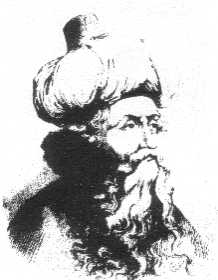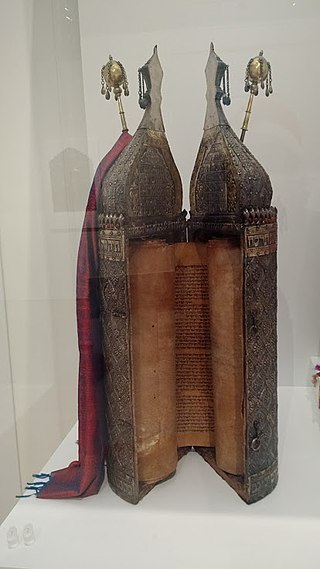
The Book of Jonah is one of the twelve minor prophets of the Nevi'im ("Prophets") in the Hebrew Bible, and an individual book in the Christian Old Testament. The book tells of a Hebrew prophet named Jonah, son of Amittai, who is sent by God to prophesy the destruction of Nineveh, but attempts to escape his divine mission.

Jonah the son of Amittai or Jonas is a Jewish prophet in the Hebrew Bible hailing from Gath-hepher in the Northern Kingdom of Israel around the 8th century BCE. He is the central figure of the Book of Jonah, one of the minor prophets, which details his reluctance in delivering the judgment of God to the city of Nineveh in the Neo-Assyrian Empire. After he is swallowed by a large sea creature and then released, he returns to the divine mission.

Ibn ʿArabī was an Andalusi Arab scholar, mystic, poet, and philosopher, extremely influential within Islamic thought. Out of the 850 works attributed to him, some 700 are authentic while over 400 are still extant. His cosmological teachings became the dominant worldview in many parts of the Muslim world.

In the biblical Book of Genesis, Ishmael was the first son of Abraham. His mother was Hagar, the handmaiden of Abraham's wife Sarah. He died at the age of 137. Traditionally, he is seen as the ancestor of the Arabs.

The Zabur is, according to Islam, the holy book of Dawud, one of the holy books revealed by Allah before the Quran, alongside others such as the Tawrāh (Torah) and the Injīl (Gospel). Muslim tradition maintains that the Zabur mentioned in the Quran is the Psalms of Dawud.
Yunus, is the 10th chapter (surah) of the Quran with 109 verses (ayat). Yunus is named after the prophet Yunus (Jonah). According to tafsir chronology, it is believed to have been revealed before the migration of the Islamic prophet Muhammed and his followers from Mecca to Medina (Hijra), as such, it is known as a Meccan surah.
Tishbe, sometimes transliterated as Thisbe, is a town mentioned in the Hebrew Bible's First Book of Kings, 1 Kings 17:1, as the residence and possibly even birthplace of the prophet Elijah, known as the Tishbite. It is placed by the biblical text in the historical region of Gilead, now in the western part of modern-day Jordan. However, the toponym may denominate another location, as discussed below.
Addas was a young Christian slave boy who lived in Taif, a mountainous area south of Mecca, during the times of Muhammad, the prophet of Islam. Originally from Nineveh, he was supposedly the first person from the western province of Taif to convert to Islam.

The Tawrat, also romanized as Tawrah or Taurat, is the Arabic-language name for the Torah within its context as an Islamic holy book believed by Muslims to have been given by God to the prophets and messengers amongst the Children of Israel. In the Qur'an, the word 'Tawrat' occurs eighteen times. When referring to traditions from the Tawrat, Muslims have not only identified it with the Pentateuch, but also with the other books of the Hebrew Bible as well as with Talmudic and Midrashic writings.
Indeed, We sent down the Torah, in which was guidance and light. The prophets who submitted [to God] judged by it for the Jews, as did the rabbis and scholars by that with which they were entrusted of the Scripture of God, and they were witnesses thereto. So do not fear the people but fear Me, and do not exchange My verses for a small price [i.e., worldly gain]. And whoever does not judge by what God has revealed - then it is those who are the disbelievers.
In the Islamic tradition, the Year of Sorrow is the 10th year of prophethood in which Muhammad's wife Khadijah and his uncle and protector Abu Talib died. The year approximately coincided with 619 CE or the tenth year after Muhammad's first revelation.

Ahimaaz ben Paltiel was a Graeco-Italian liturgical poet and author of a family chronicle. Very little is known about his life. He came from a family some of whose members are well known in Jewish literature as scholars and poets; for example, Shefatya ben Amitai, Hananiel ben Amittai, and his nephew Amittai ben Shephatiah. Ahimaaz had two sons, Paltiel and Samuel. The family tree of this clan is given by Ahimaaz in his Chronicle:
When the Islamic prophet Muhammad initially spread Islam in his hometown, Mecca, he did not meet with any significant opposition from his tribesmen, the Quraysh. Rather, they were indifferent to his activities, as they did not appear to be particularly interested in devotional meetings. This was the case until Muhammad started attacking their beliefs, which caused tensions to arise. The Muslims then reportedly received persecution that lasted for twelve years beginning from the advent of Islam to Hijrah.
The Islamic prophet Muhammad went to the city of Ta’if in the year 619 AD.
The Quran contains references to more than fifty people and events also found in the Bible. While the stories told in each book are generally comparable, there are also some notable differences.

Beit Ummar is a Palestinian town located eleven kilometers northwest of Hebron in the Hebron Governorate of the State of Palestine. According to the Palestinian Central Bureau of Statistics, in 2017, the town had a population of 16,977 inhabitants. Over 4,800 residents of the town are under the age of 18. Since the Second Intifada, unemployment ranges between 60 and 80 percent due mostly to the inability of residents to work in Israel and a depression in the Palestinian economy. A part of the city straddles Road 60 and due to this, several propositions of house demolition have occurred.
The Quran states that several prior writings constitute holy books given by God to the prophets and messengers amongst the Children of Israel, in the same way the Quran was revealed to Muhammad. These include the Tawrat, believed by Muslims to have been given by God to the prophets and messengers amongst the Children of Israel, the Zabur revealed to David (Dawud); and the Injil revealed to Jesus (Isa).
Prophets in Islam are individuals in Islam who are believed to spread God's message on Earth and serve as models of ideal human behaviour. Some prophets are categorized as messengers, those who transmit divine revelation, most of them through the interaction of an angel. Muslims believe that many prophets existed, including many not mentioned in the Quran. The Quran states: "And for every community there is a messenger." Belief in the Islamic prophets is one of the six articles of the Islamic faith.
Yunus ibn Matta is a prophet of God in Islam corresponding to Jonah son of Amittai in the Hebrew Bible. Jonah is the only one of the Twelve Minor Prophets in the Hebrew Bible to be named in the Quran. The tenth chapter of the Quran, Yunus, is named after him.

2 Kings 14 is the fourteenth chapter of the second part of the Books of Kings in the Hebrew Bible or the Second Book of Kings in the Old Testament of the Christian Bible. The book is a compilation of various annals recording the acts of the kings of Israel and Judah by a Deuteronomic compiler in the seventh century BCE, with a supplement added in the sixth century BCE. This chapter records the events during the reigns of Amaziah the son of Joash, king of Judah, as well as of Joash, and his son, Jeroboam (II) in the kingdom of Israel. The narrative is a part of a major section 2 Kings 9:1–15:12 covering the period of Jehu's dynasty.
Tanhum ben Joseph of Jerusalem, also known as Tanḥum ha-Yerushalmi (1220–1291), was a 13th-century Hebrew lexicographer and biblical exegete who compiled several Hebrew works, the most notable of which being a lexicon on Mishnaic words entitled Murshid al-kāfī. Tanhum's learning in Jewish studies was so pervasive that he was coined the name "the Abraham ibn Ezra of the Levant."








